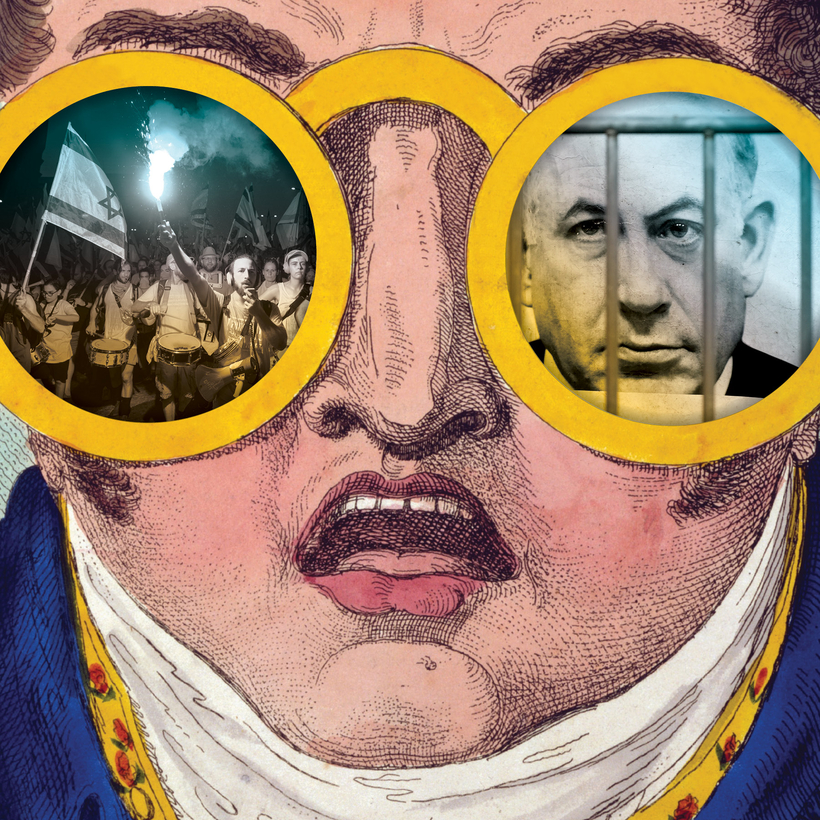“This is the most important battle of my life,” says Erez Nevo, a lifelong warrior for Israel who has joined the masses of military and intelligence veterans protesting the country’s radical, right-wing government. The crowds grew in size and anger when the Knesset on Monday passed a law that weakens the Supreme Court and Israel’s claim to be the Middle East’s sole democracy.
The fallout also threatens to diminish the stability of the Israel Defense Forces (I.D.F.) as the region’s pre-eminent military power, because a crisis of morale has erupted.

Colonel Nevo is a former commander of Flotilla 13, the equivalent of America’s navy SEALs, and, until five months ago, head of the Mossad’s most secretive operations team. He fought against Israel’s enemies in Gaza and Lebanon, and in clandestine forays against Syrians and Iranians. But he considers the battle of wills in Israel as the most emotional and exciting of his life. The 56-year-old told us he has always struggled to defend a democratic, Jewish state, and that is what he is doing now.
The Knesset on Monday passed a law that weakens the Supreme Court and Israel’s claim to be the Middle East’s sole democracy.
As the Knesset voted, he was among 15,000 air-force, intelligence, and army reservists—many in the most elite units and frequently activated—who declared that they will protest by not showing up for duty. We heard several say that they won’t risk their lives for a regime turning into a dictatorship. Their vow was backed, in writing, by most of the former chiefs of the I.D.F., the Mossad, and the domestic Shin Bet security service, who wrote that they fully understand why brokenhearted reservists feel the judicial overhaul violates the essence of the democracy they have been fighting to defend—and thus will refuse to serve.
Prime Minister Benjamin Netanyahu, himself a commando soldier in his youth, is obviously shaken by the threat. At first he condemned the “refusal” phenomenon, but now he is trying to more gently persuade the intelligence and military forces that there’s nothing to fear. He swears that he’ll protect democracy. But his credibility has shrunk to the size of a subatomic particle.
Adding to the widespread distrust of his leadership and promises, it is now clear that, just days before the dramatic parliamentary vote, he lied about his medical condition. Netanyahu tried to conceal a heart ailment which compelled his doctors to implant a pacemaker.
Members of his coalition accuse liberals in the military—calling them “spoiled and privileged traitors”—of trying to stage a coup d’état. Right-wing Cabinet members posed for selfies inside the Knesset and beat their chests with pride, boasting that they had refused to bend. At this bitter stage, both sides see compromise as surrender.

Colonel Nevo doesn’t deny that there’s a kind of coup underway—nonviolent resistance aimed at forcing the government to change course. He shares the I.D.F. leadership’s worry that Israel’s security readiness is being eroded when key personnel don’t participate in training and operations. Nevo and his ilk feel certain that the prime minister is to blame—not the protesters, whom they laud as the true patriots.
The fallout also threatens to diminish the stability of the Israel Defense Forces as the region’s pre-eminent military power, because a crisis of morale has erupted.
He has studied and monitored dictatorships in the Middle East, and, “based on my Mossad experience, I fear the divisions and cracks in our national cohesion, as our military disintegrates.” Nevo told us the very existence of Israel, which celebrated 75 years of independence in May, is imperiled—“not because of our enemies, but our own government. And one person is responsible for that: Netanyahu.”
The prime minister still has his fans, notably Israelis who contend that they’ve been disrespected by a liberal ruling class—somewhat similar to Trump supporters. They ignore the irony that Netanyahu and his family, like the Trumps, are scions of their country’s elite. There was a large demonstration in Tel Aviv, last Sunday night, in favor of his coalition’s push against liberal judges. While the prime minister says noisy crowds on both sides prove that Israel has a vibrant democracy, Colonel Nevo says he and many others fear that a civil war—in Hebrew, “a war of brothers”—will break out.
President Joe Biden plainly shares that concern. He told Netanyahu directly—and through public statements—that Israel’s democracy could be shattered by the judicial overhaul. Rushing it through without forging a national consensus would make no sense, Biden said. The long partnership with the United States depends on shared values and shared interests—notably, Middle East intelligence, joint projects against Iran, and the tantalizing possibility of Israeli-Saudi pro-Western cooperation. Biden’s alarm about an unstable Israel was genuine. But Netanyahu wasn’t listening.
His is not a need simply to keep coalition partners happy. He also wants the so-called reform in order to block any attempt by the Supreme Court to force him to step down, if he’s convicted in any of the three slow-moving trials in which the prime minister is charged with influence-peddling and fraud.
The opposition-party leaders—former prime minister Yair Lapid and Benny Gantz, who served Netanyahu as defense minister—support the protesters and have spoken at some of the biggest rallies. Yet they are unwilling to cross a red line by endorsing any refusal to serve, so they urge reservists to report for duty.
However, the movement—reminiscent of Americans’ protests against the Vietnam War half a century ago—swears allegiance to no politician and seems to trust none of them.

Military heroes who dissent courageously do earn respect. How far might they go? The notion of the army defying orders—or, almost unthinkably in Israel, taking over the government—would seem nothing that supporters of freedom would ever embrace. Yet there are a few historical precedents for a pro-democracy coup d’état, including 1974’s Carnation Revolution, which ended a long dictatorship in Portugal.
Colonel Nevo doesn’t deny that there’s a kind of coup underway.
In Israel, a country perpetually feeling itself at war, the refusal to serve is a strong protest that puts significant pressure on politicians. The I.D.F. depends on its highly experienced reserves, and most bombing missions are flown by air-force reservists.
When pressed as to whether they would rush to the front lines if an actual war broke out, several leaders of the protest movement acknowledge that they would. So their threat may be somewhat hollow.
But we heard from a few senior officers willing to take the more extreme step. A recent head of the I.D.F.’s cyber-war directorate who was also a pilot, Brigadier General Yaron Rosen, has frequently served as a reservist. The 56-year-old now declares that even if there is a war, he would refuse to serve—unless the judicial-overhaul legislation were canceled.
It has been stunning to see how more than half of Israelis, according to polls, recognize that Netanyahu’s tinkering with obscure standards for judges and courts can lead to a palpable diminution of civil rights.
The details of the law passed on Monday are the kind that only legal scholars habitually debate. The Knesset abolished the “reasonableness” standard that judges used to strike down government appointments and actions. Israel has no constitution, so the courts’ judgments are the only check and balance. After all, the prime minister has the job because of controlling a majority in parliament, so there is no division between executive and legislative branches.
Netanyahu’s ministers claim that nearly all the 15 justices on the Supreme Court are liberals who rule frequently against Orthodox Jews, in favor of Palestinians, and against West Bank settlers. Legal analysts say nearly half the justices are actually quite conservative. The government openly says its next step will be changing how judges are chosen, so that more conservatives serve on the high court. The protest movement contends that the entire process is “a judicial coup” that is already making gays, many women, the irreligious, non-Jewish citizens, stateless West Bank Palestinians, and immigrants feel threatened.

Netanyahu has offered to postpone further moves until late November, to allow time for negotiations with the opposition parties. Previous talks mediated by the president, Isaac Herzog, broke down with each side blaming the other. Herzog recently addressed the U.S. Congress and visited President Biden, pledging to strive again to bridge the gaps in what Herzog calls “an emergency situation.”
When Netanyahu delivered a speech, hours after Monday’s vote, he promised to protect democracy and said Israel will never be a theocracy governed, as he put it, by Jewish law, Halacha. But no one seemed to believe him. Yair Lapid said those were only “empty words” because “Netanyahu is not really the prime minister.”
He has, in fact, granted broad powers to two ministers in particular. One is Bezalel Smotrich, now the finance minister, who in 2005 was detained by Shin Bet for allegedly plotting violence to stop Israel’s withdrawal from Gaza; he is also notorious for opposing gay rights. The other is Itamar Ben-Gvir, head of the Jewish Power party and now the minister in charge of the police, though he was arrested dozens of times and convicted in 2007 of supporting an anti-Arab terrorist group.
The protesters say Smotrich and Ben-Gvir, extreme right-wingers in the sense that they want to annex the occupied West Bank, are calling all the shots. Netanyahu does need them. If their small parties were to quit the coalition, the government would fall; and polls indicate that, this time, Netanyahu’s opponents would likely win an election. None is due until 2027.
Ben-Gvir clearly enjoys taunting his political opponents—and on the eve of the Knesset vote, he issued a short, childish statement: “The salad bar is open!” Everyone understood that he and his allies saw eliminating the “reasonableness” standard as a tiny appetizer, leading to a full meal of changes aimed at pushing aside Israel’s courts. The Jewish nationalists want a less liberal society, an end to efforts to compel ultra-Orthodox Jews to serve in the I.D.F., and—above all, with their narrow and ungenerous reading of Biblical history and geography—the West Bank in Jewish hands forever.
The founding father of the modern Jewish state, Prime Minister David Ben-Gurion, coined the term “the people’s army,” for the nascent I.D.F. Although from the start it was only half true—as ultra-Orthodox Jewish students and Israeli Arab citizens were exempt from mandatory military or national service—yet the label was a powerful and persuasive tool to build a national ethos.
Now, however, mired in dissent over whether to intervene in or sidestep the country’s most severe domestic crisis, the Israel Defense Forces and the Mossad are in great danger of being unable to fulfill their declared mission of defending Israeli democracy.
Yossi Melman, defense-and-intelligence analyst for the Israeli newspaper Haaretz, and former CBS News correspondent Dan Raviv are co-authors of Spies Against Armageddon: Inside Israel’s Secret Wars. Melman reports from Jerusalem, and Raviv from Washington

